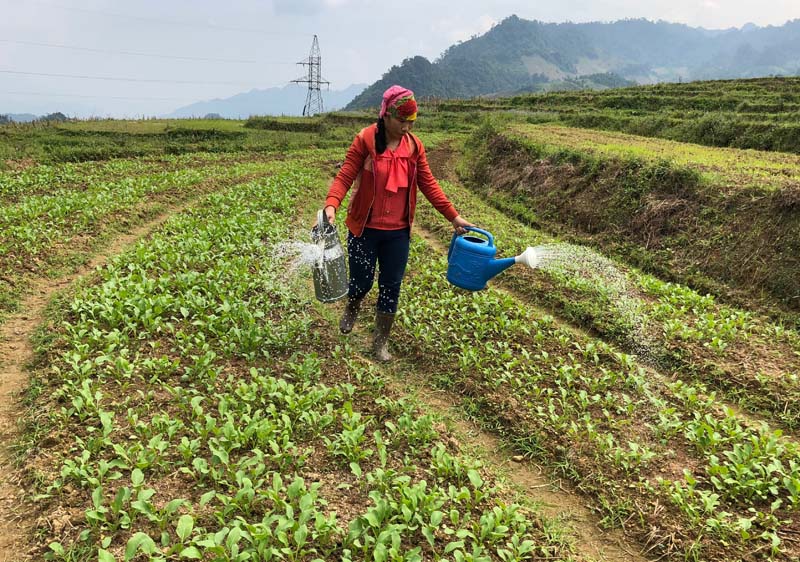
(HBO) - In recent years, mountainous communes of Mai Chau district have actively expanded vegetable cultivation areas. Approximately 80 percent of vegetable output of the district is provided for Hanoi, Hung Yen, Hai Duong, Quang Ninh, and Hai Phong.
In order to increase the supply chain of safe food in
general and safe vegetables in particular to protect consumers’ health, the agro-forestry-fishery
product quality management sub-department
selected Tan Son commune of Mai Chau district to build a safe vegetable production
and consumption model applying Vietnamese Good Agricultural Practices (VietGAP).

Member
households of the Tam Hoa Cooperative applythe VietGAP production process
in vegetable cultivation.
Carried out since July 2018, the model is joined by
the Tam Hoa agricultural service and development cooperative and ten vegetable-farming
households. In order to effectively implement the model, many measures have
been taken to upgrade and improve infrastructure facilities to meet VietGAP
requirements for vegetable cultivation. A training course was organised for 20
local residents both members and non-members of the cooperative.
In order to ensure the efficient and sustainable
development of the Tam Hoa agricultural service and development cooperative,
the sub-department has supported the establishment of the VietGAP board to coordinate
with the cooperative in developing a quality management system, which focuses
on quality policy and objective, techniques for chayote, choysum, cabbage,
spinach, and pumpkin farming.
The system also includes regulations on management and
use of seeds, cultivation land, fertilizers, plant protection products; harvesting
and processing; and handling violations in meeting VietGAP requirements.
The cooperative has signed contracts and memoranda of understandingfor supplying safe
vegetable products with a number of safe
vegetable trading establishments
in Hanoi, Bac Ninh and Hung yen provinces./.
Since the beginning of this year, under the direction of the Department of Agriculture and Environment, the Sub-Department of Agricultural, Forestry, and Fishery Product Quality Management has strengthened the integration of the professional activities to promote and guide the organizations and individuals in the production and trading of agricultural, forestry, and fishery products to comply with the legal regulations regarding the use of chemicals, pesticides and veterinary medicines in crop cultivation, livestock farming and aquaculture. They also provide guidance to processing and manufacturing establishments on keeping the records to trace the product origins and using food additives from the approved list according to the regulations.
Hoa Binh province saw a significant rise in state budget revenue in the first two months of 2025, heard a meeting chaired by Vice Chairman of the provincial People’s Committee Quach Tat Liem.
Ha Thi Ha Chi, a 26-year-old graduate in law, has taken an unconventional path by returning to her hometown in Mai Chau district to establish the Tong Dau Cooperative, creating stable jobs for local women and bringing Thai ethnic brocade weaving to the global market.
As the Lunar New Year 2025 approached, pork prices surged, creating a profitable season for farmers in Tan Vinh commune, Luong Son district. Taking advantage of the rising demand, Can Minh Son, a farmer from Coi hamlet, sold over 30 pigs at 69,000 VND/kg, each weighing more than 100 kg. After deducting expenses, his family earned a profit of over 50 million VND.
alternate member of the Central Party Committee, Secretary of the Hoa Binh provincial Party Committee Nguyen Phi Long on March 5 had a working session with Yan Jiehe, Founder and Chairman of the China Pacific Construction Group, one of China's largest private corporations in the field of transport infrastructure. Deputy Secretary of the provincial Party Committee, Chairman of the provincial People's Committee Bui Duc Hinh and leaders of provincial departments and sectors also attended the working session.
The electronic printed circuit board (PCB) manufacturing and processing plant of Japan’s Meiko Group, located at Da River Left Bank Industrial Park in Hoa Binh city with a total investment of over 200 million USD, is expected to create thousands of jobs and make a significant contribution to the local budget.



